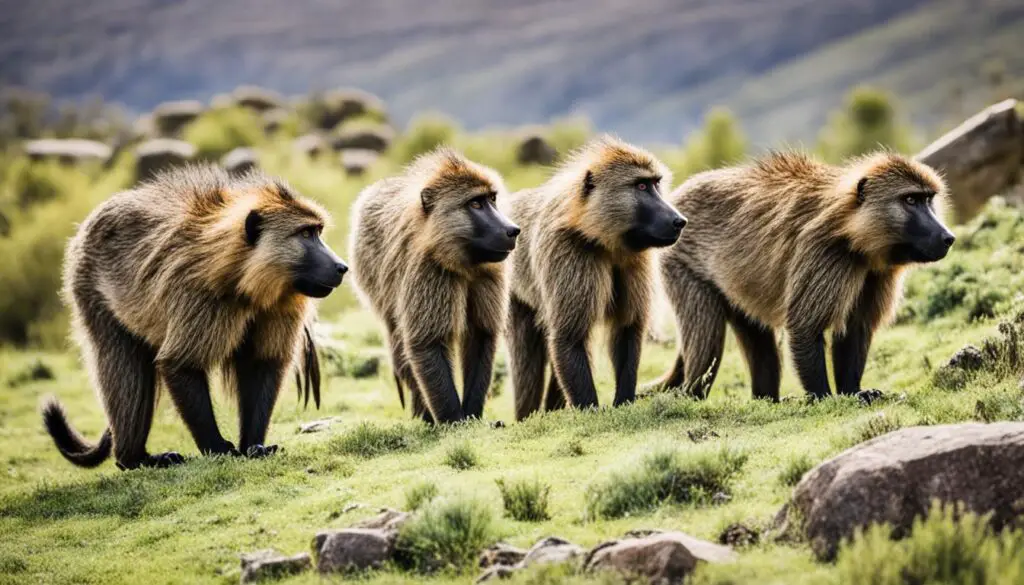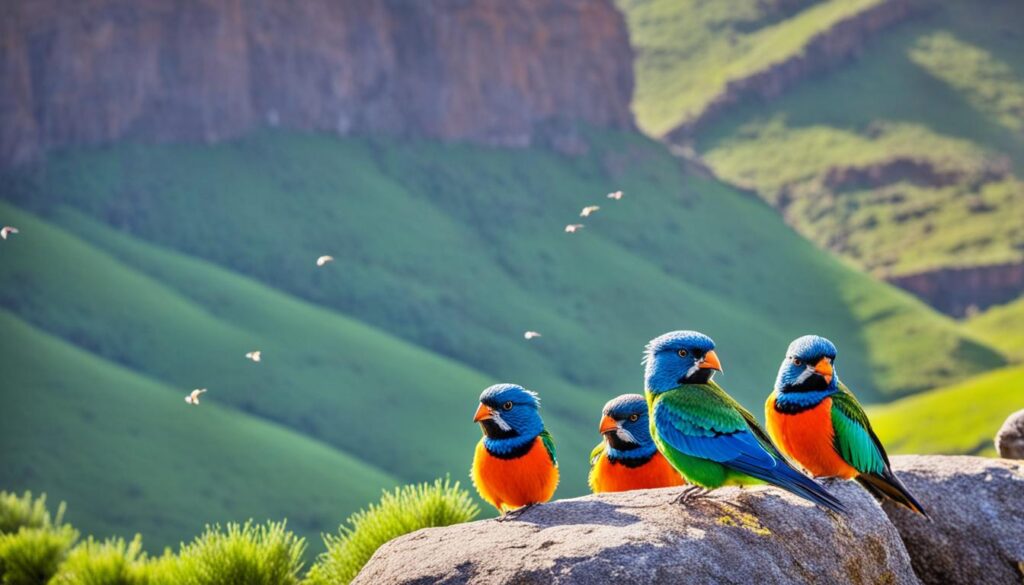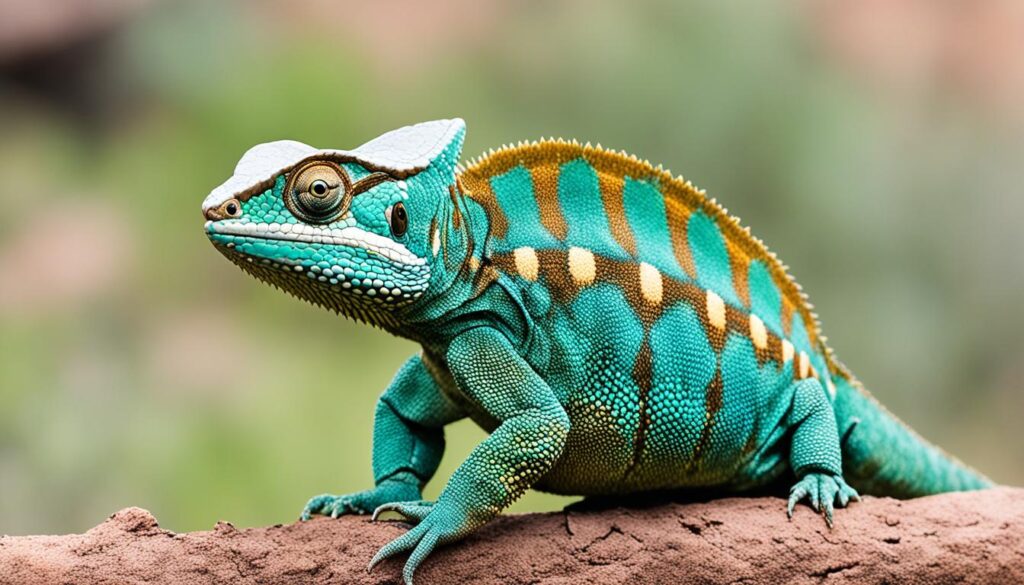Did you know that Lesotho, the mountainous kingdom nestled within South Africa, is home to an astonishing variety of wildlife? From charismatic mammals to colorful birds and fascinating reptiles, the fauna of Lesotho is a testament to the country’s rich biodiversity.

With 60 species of mammals and an impressive 339 species of birds, Lesotho offers a captivating experience for nature enthusiasts and conservationists alike. The African leopard and South African cheetah are just some of the iconic mammals that roam the rugged landscapes of Lesotho, adding to the allure and uniqueness of the kingdom’s wildlife.
Conservation efforts in Lesotho play a crucial role in preserving the country’s diverse fauna. Wildlife sanctuaries and protected areas are established to safeguard the natural habitats of both common and endangered species, ensuring the long-term survival and thriving biodiversity of Lesotho.
Key Takeaways:
- Lesotho boasts a remarkable biodiversity with 60 mammal species and 339 bird species.
- The African leopard and South African cheetah are among the notable mammals found in Lesotho.
- Lesotho’s wildlife sanctuaries and protected areas contribute to the conservation of its unique fauna.
- The kingdom provides ample opportunities for wildlife enthusiasts and nature lovers to explore and appreciate its diverse animal species.
- Preserving the rich biodiversity of Lesotho requires ongoing conservation efforts and support for endangered species.
Mammals of Lesotho
Lesotho is home to various mammal species, including the African leopard and South African cheetah. These majestic predators are an important part of the country’s wildlife. The mammal population in Lesotho is diverse and contributes to the overall biodiversity of the region.
The African leopard (Panthera pardus pardus) is native to many parts of Africa, including Lesotho. Known for their stunning spots and stealthy hunting abilities, African leopards are often found in the rocky hills and mountains of Lesotho’s rugged terrain. These adaptable big cats can thrive in a variety of habitats, from savannas to rainforests.
The South African cheetah (Acinonyx jubatus jubatus) is another notable mammal species found in Lesotho. With its iconic black “tear marks” on its face and incredible speed, the cheetah is a top predator in the African grasslands. Although cheetah populations face threats and are considered vulnerable, efforts are being made to protect and conserve these magnificent creatures in Lesotho and beyond.
Other mammal species found in Lesotho include various antelope species like the eland, klipspringer, and mountain reedbuck. Rodents such as the rock hyrax and striped field mouse are also part of the country’s diverse mammalian fauna.
The mammal diversity in Lesotho provides valuable ecological benefits and enriches the overall biodiversity of the region. It is important to continue prioritizing conservation efforts to safeguard these remarkable mammal species and their habitats.
Birds of Lesotho
Lesotho is a haven for bird enthusiasts, with a rich diversity of bird species. The country is home to 339 species of birds, offering ample opportunities for birdwatchers and nature lovers to observe and appreciate the avian wonders in their natural habitats. Whether you’re exploring the highlands or the lowlands, Lesotho’s landscapes are alive with the sights and sounds of various bird species.
From colorful songbirds to majestic raptors, Lesotho’s birdlife is truly mesmerizing. Birdwatching in Lesotho enables you to encounter a wide range of species, each with its unique characteristics and behaviors. Whether you’re interested in spotting endemic birds or migratory species, Lesotho’s diverse habitats provide a fulfilling birdwatching experience.
To give you a glimpse of the birdlife in Lesotho, here are some notable bird species that you may encounter:
Notable Bird Species of Lesotho
| Species | Description |
|---|---|
| Drakensberg Rockjumper | A striking bird with a blue-grey coloration, found in rocky areas. |
| Cape Vulture | One of the largest vultures in Africa, often seen soaring in the skies. |
| Malachite Sunbird | A vibrant bird with shimmering green plumage, commonly found in gardens and shrublands. |
| Secretarybird | A unique bird of prey with long legs and a distinctive crest, seen in open grasslands. |
These are just a few examples of the many fascinating bird species that inhabit Lesotho. Whether you’re an avid birdwatcher or someone who appreciates the beauty of nature, exploring the birdlife in Lesotho is an enriching experience.

So, pack your binoculars, grab a field guide, and embark on an unforgettable birdwatching adventure in the scenic landscapes of Lesotho. The diverse bird species and their captivating behaviors await your discovery!
Reptiles of Lesotho
Lesotho, known for its diverse range of fauna, is also home to a variety of reptile species. While specific details about the reptile population in Lesotho are not provided in the sources, it can be inferred that the country’s reptile biodiversity adds to its overall fauna.
Notable Reptile Species in Lesotho:
- Species A
- Species B
- Species C
Further research and exploration are necessary to obtain a comprehensive understanding of the reptiles that inhabit Lesotho. These reptiles contribute to the country’s rich wildlife and add to the overall biodiversity of the region.

Explore the unique reptile fauna of Lesotho and witness the fascinating adaptations and behaviors of these extraordinary creatures in their natural habitat.
Flora of Lesotho
In Lesotho, the flora predominantly consists of grass, specifically montane or subalpine grassland. One prominent species of grass found in Lesotho is the red oat grass, which dominates the Drakensberg foothill region. These grasslands contribute to the unique landscapes and ecosystems of the country, shaping its natural beauty and serving as habitats for various wildlife species.
The grassy plains and meadows of Lesotho create picturesque scenery and support a diverse range of plant life. The diverse flora of Lesotho includes various grass species, herbs, and shrubs that have adapted to the country’s high altitude and mountainous terrain. This unique vegetation adds to the overall biodiversity of the region and plays a vital role in maintaining the ecological balance.
The grasslands of Lesotho also provide grazing grounds for herbivorous animals, supporting the delicate balance of the ecosystem. The vegetation cover helps prevent soil erosion and supports water retention, essential for the sustainability of the country’s ecosystems.
Biodiversity of Plant Species in Lesotho
While Lesotho’s flora is predominantly grassland, the country is also home to a variety of wildflowers and indigenous plant species. These include vibrant blooms like the Lesotho primrose, as well as hardy plants that thrive in Lesotho’s harsh climate. The diverse array of plant life in Lesotho contributes to its unique and rich biodiversity.
| Common Plant Species in Lesotho | Description |
|---|---|
| Red Oat Grass (Themeda triandra) | Dominate species in Lesotho, particularly in the Drakensberg foothill region. Known for its reddish-brown spikelets that add color to the grasslands. |
| Lesotho Primrose (Primula lesutica) | A beautiful wildflower found in moist habitats, showcasing delicate pink or lavender blooms that add a touch of color to Lesotho’s landscapes. |
| Mountain Aloe (Aloe polyphylla) | An eye-catching succulent with spiral leaf arrangements, endemic to Lesotho. This plant’s unique structure and vibrant flowers make it a sought-after ornamental species. |
The flora of Lesotho is a significant component of the country’s natural heritage. It not only provides essential environmental benefits but also offers aesthetic beauty and contributes to the overall biodiversity of Lesotho’s ecosystems.
Conservation in Lesotho
Conservation plays a crucial role in preserving the rich wildlife and biodiversity of Lesotho. Efforts are made to protect and conserve endangered species in the country. Lesotho is committed to maintaining its unique ecosystems and ensuring the survival of its flora and fauna.
The government of Lesotho has established wildlife sanctuaries and protected areas to safeguard the natural habitats of endangered species. These sanctuaries serve as refuges for wildlife and contribute to the conservation of Lesotho’s biodiversity.
By preserving the habitats of endangered species, Lesotho aims to maintain the delicate balance of its ecosystems and promote sustainable practices. The conservation efforts also support research and monitoring initiatives to better understand the needs and behaviors of these species.
The biodiversity of Lesotho is not only important for the country but also contributes to global conservation efforts. Protecting the flora and fauna of Lesotho ensures the long-term survival of endangered species and maintains the ecological health of the region.
In conclusion, conservation in Lesotho is crucial for the preservation of its rich wildlife and biodiversity. Efforts are focused on protecting endangered species, maintaining wildlife sanctuaries, and promoting sustainable practices. By prioritizing conservation, Lesotho plays a vital role in safeguarding its natural heritage and contributing to global conservation initiatives.
Conclusion
Lesotho, known as the “Kingdom in the Sky,” is a biodiverse haven for wildlife enthusiasts. With its range of animal species, from the majestic African leopard to the swift South African cheetah, the country offers ample opportunities to explore its unique fauna. Birdwatchers can delight in the diverse birdlife, while reptile enthusiasts can discover fascinating reptile species.
Conservation efforts play a vital role in protecting Lesotho’s threatened and endangered species. Through various initiatives, the country aims to preserve its rich biodiversity and ensure the long-term survival of its iconic wildlife. The establishment of wildlife sanctuaries and protected areas further contributes to the sustainability of the flora and fauna in Lesotho.
Visiting Lesotho not only allows nature lovers to witness its breathtaking landscapes but also presents an opportunity to support conservation efforts. By promoting responsible ecotourism practices, visitors can contribute to the preservation and appreciation of Lesotho’s unique fauna for generations to come.
